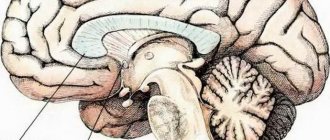A huge number of people around the world suffer from one or another phobia. Phobias are intense fears of very specific things or objects. The cause of a phobia can be places or certain situations. insects or animals. Fear of specific animals, such as cats and dogs, is very common among children and adolescents. And among adults, the most common are arachnophobia and hemophobia - fear of spiders and the sight of blood. When a person suffers from a phobia, they avoid places, things or animals that cause fear at all costs. And this is not so simple. But where do phobias come from and why are there so many of them?
How do phobias develop?
Specific phobias are very common, especially among children and adolescents. Research shows that approximately 10% of children will experience some type of specific phobia, making this type of anxiety one of the most common anxiety disorders in the world. According to the American Psychiatric Association (APA), phobias are the most common mental illness among women and the second most common among men. In Russian megacities, approximately every tenth person suffers from one or another phobia. Many phobias arise in childhood or adolescence, but can haunt a person into adulthood. Researchers identify three main scenarios that can influence the development of a phobia.
Scary to the point of nausea: What are phobias and where do they come from?
A PHOBIA IS A FEAR THAT IS NOT POSSIBLE TO CONTROL. It can be caused by a certain object, place, process, situation or even a feeling - there are a lot of phobias, but each one is based on strong anxiety. At the same time, everyone encounters the latter from time to time. We’ll figure out how to distinguish ordinary anxiety from a phobia and what to do to stop panic, together with experts: psychotherapist at the Vitbiomed+ clinic Elena Samsonova, neuropsychologist Mikhail Ivanov and airline pilot Alexey Kochemasov.
When a phobia arises An unpleasant conversation with your boss, misunderstanding in the family, a strict deadline - all this can be disturbing. This state cannot be called pleasant, but in general the situation remains under control - this is the so-called adaptation anxiety, which usually passes quickly. But there is another anxiety - pathological. The main difference between pathological anxiety is that the experience of a threat does not correspond to reality, that is, there is no real reason for a violent reaction. During an attack of anxiety, a person ceases to control the situation, and health deteriorates sharply: it becomes difficult to breathe, he feels hot or shivering, dry mouth, nausea, and dizziness appear. These “symptoms” of panic are associated with activation of the hypothalamus and autonomic centers of the brain.
According to doctor Elena Samsonova, anxiety disorders can be hereditary: children whose relatives have encountered this problem are at higher risk of developing a phobia. Severe stress can also trigger its appearance. Pathological anxiety occurs spontaneously or in response to a specific stimulus (trigger) and intensifies over time. Very often, the trigger is animals (dogs, cats), including insects (spiders, cockroaches), natural phenomena (severe thunderstorm, hurricane) or certain actions and processes (flying on an airplane, taking an elevator).
What are the types of phobias? Aerophobia occupies a leading place in the list of fears. Pilot Alexey Kochemasov says that some people are afraid to fly only because they do not understand what is happening on the plane. They are frightened by sounds, shaking, steam, as well as the inability to control the process - because on the plane you can’t even see where exactly you are going. In this case, it helps to understand what is happening and at what moment - to do this, you can subscribe to blogs of pilots and flight attendants or read a special guide like “An easy way to stop being afraid of flying.” By the way, trying to relax with the help of alcohol is not the most effective way: the fear will not go away, but it is easy to get drunk in the air even from the amount of alcohol that seems harmless on the ground (this is due to oxygen starvation when gaining altitude).
Of course, not in all cases you can cope on your own. The causes of aerophobia may lie in strong feelings due to plane crashes: although, according to statistics, an airplane is many times safer than a car, tragedies involving airplanes are always widely represented in the media. For the same reason, aerophobia is rarely associated with a fear of heights, because a person is not afraid of being at a height, but of the fact that something will happen to the plane.
Another common fear is agoraphobia, or fear of open spaces. A person cannot be, for example, in the square - he begins to panic, it becomes difficult to breathe, his vision darkens, it seems that he is about to faint. Neuropsychologist Mikhail Ivanov notes that with agoraphobia a person may consciously want to be on the square or stage, but his nervous system “votes” against it.
NOMOPHOBIA (no mobile phone phobia) - fear of losing your phone or being left without communication. Back in 2010, such a phobia was noted in half of the people surveyed.
When working with a psychotherapist, it may become clear that a person is subconsciously afraid of ending up in an awkward or inappropriate position “in front of everyone.” Sometimes panic develops when you need to speak in front of an audience; perhaps, when you work through this situation with a specialist, it turns out that the fear of not doing it well enough prevents you from speaking in public.
The opposite fear is claustrophobia, in which panic occurs in a confined space, such as a windowless room or elevator, or in crowds of people. The causes of claustrophobia are not fully understood. Elena Samsonova notes that the problem can be triggered by severe stress suffered in childhood: for example, the child was locked in a cramped room as punishment, or he was accidentally locked in a closet. It is believed that claustrophobia develops due to dysfunction of the amygdala, the area of the brain responsible for the feeling of fear.
There are many phobias associated with animals - most often people are afraid of spiders, snakes and dogs - but the causes of zoophobia are not fully understood. According to one version, fear of snakes or spiders could have developed during evolution as a means of protecting humans from fatal bites. Fear of dogs or cats can be associated with the experience of an attack by these animals or even the possibility of such an attack - for example, if a person is impressed by a story about how a dog bit a friend.
Fear of heights is natural - the brain receives information about a loss of control, and the person begins to feel defenseless. Such fear is associated with the instinct of self-preservation, but this is not the same thing: a defensive reaction in the form of fear arises in a really dangerous situation, for example, on the edge of a precipice. But if you look down from a twentieth-floor window and are afraid, you have acrophobia, because there is no threat to life as such. True, spectacularly designed observation decks with glass floors can cause a panic attack even in those who have never noticed a fear of heights - this is due to the fact that the brain receives conflicting information: the legs are standing steadily, and the eyes see an opening abyss.
Fear of intimate relationships is quite rare, but a very complex fear, and in women it is usually associated with a painful first experience, gynecological problems that cause discomfort, sexual violence, distrust of a partner, insecurity in one’s own body, and an instilled attitude towards sex as a something shameful. Over time, accumulated fears can develop into a phobia. The method of dealing with the latter depends on its cause - in case of pain or inflammatory disease, one cannot do without an examination by a gynecologist.
Another common phobia is iatrophobia, that is, the fear of doctors, which is usually associated with an unpleasant episode experienced or simply impressionability as a result of someone’s scary stories. Not going to the doctors is a bad decision, so it is better to do your research and find a doctor you trust; You can ask the doctor to explain at the appointment what exactly will happen now - understanding helps you not to be afraid.
Why you need to fight uncontrollable fear Knowing about your phobia, a person tries to avoid encounters with a trigger - for example, he refuses to travel on the subway or constantly postpones a visit to the dentist, which only worsens the quality of life. If rational anxiety does not lead to serious consequences for a person and his lifestyle and goes away on its own, then pathological anxiety requires the help of specialists: a neurologist and a psychologist or psychotherapist. In essence, a phobia is the tip of the iceberg: an anxiety disorder creates interference on many levels. And if you defeat him, pleasant changes will occur in those areas of life where they were not expected at all.
The panic attack itself can be alleviated: first you need to find support (a wall or a bench) and take a stable position. Then you need to tell yourself that the attack will definitely end; You can repeat several times: “This is just fear that will soon pass.” Finally, you need to focus on deep breathing (it’s best to breathe with your stomach): inhale for three to four seconds and exhale even more slowly for about six seconds. This technique helps to cope with panic - and in general, meditation and deep breathing are effective in any stressful situations.
If you are constantly afraid of something and worried about various reasons, and anxiety persists even with a successful outcome of events, do not put off visiting a psychotherapist or psychiatrist. They solve problems of phobias using methods such as psychoanalysis, cognitive behavioral psychotherapy or gestalt therapy. If fear is accompanied by rapid heartbeat, sweating, and dizziness, treatment should begin by taking medications prescribed by a psychotherapist.
Author: wonderzine.com
Modeling
A phobia develops when you see someone close to you being very scared (of a specific situation or a certain animal/insect). This is called “modelling”. When you see someone else “modeling” the fear response to certain things, you are able to learn to be afraid of those same things. Situations where parents often tell their children that (for example) dogs are dangerous, you shouldn’t approach them, you need to be careful of dogs, and so on, teaches the child that ALL dogs are ALWAYS dangerous. Such stories from adults can contribute to the development of a real phobia at an early age.
Agoraphobia - fear of open space
Anna
Photo: pixabay.com As a child, I ate little and slowly.
At home it didn’t cause any trouble—they didn’t scold me or push me. Sit in front of the plate as long as you want. But in kindergarten this became a real problem. While giving me food, the teacher and the nurse joked: “You don’t have to give it to her, she won’t eat” or “She wants to die of hunger, look how thin she is.” I once talked about a trip to visit my grandmother in the village. After that, a new joke appeared: “You probably made a hole in your mouth there.” I don’t know what was funny about it, but everyone laughed - both children and adults. I was offended, I was upset because of the injustice of what was happening. I knew that this was not true and my mouth was not full of holes. I just can't eat fast. All this was repeated several times a day, and since then I have not been able to eat in public - several years ago I realized that this was a phobia that I could not do anything about. There are times when I haven’t eaten all day and am very hungry. I come to a cafe and realize that I simply physically cannot take up food - it seems that now everyone will look at me, laugh, and point fingers. Although I understand that adults don’t do that.
I can calmly think about eating in public catering, imagine how I will come and order something. But the moment a plate appears in front of me, I feel uncomfortable, trembling in my hands, food in my throat, and I may feel severe nausea or sweat.
I didn’t try to retrain myself—I learned to adapt to my own fears. I try to schedule my activities so that I can eat alone at home. Or, for example, my boyfriend and I buy take-out food, go into the car and eat in the back seat - so that no one looks at us through the windshield. The young man knows about my problem and treats it calmly. He has his own psychological difficulties, we understand each other and support each other.
I can also eat, for example, at a friend’s house - the main thing is that there is no other group of people around and no one is looking at me. Any kind of feast is not for me.
My fear greatly affects my life in general. Human communication is largely built around food. Many people go on dates to cafes, groups of friends get together and have feasts, children's holidays are also celebrated with treats and cake. Of course, I can come to a celebration or a friendly meeting. I put a piece of bread or shish kebab on my plate and sit with it for hours. Questions often start: “Why don’t you eat? She said that she was hungry.” I try not to explain anything to people about my phobia. I say that I had lunch at home or that my stomach is uncomfortable. Often, if you sit at the table and do not eat, this is perceived as an insult to the owner of the house. For some reason, it doesn't occur to people that you might have psychological difficulties with food.
I'm twenty-four years old, and I'm used to living like this. I don't think I need to change anything. At one time, when I worked in a small team, during lunch I ate, turning away from my colleagues. I honestly explained to them that I couldn’t eat lunch when someone was looking at me. Colleagues took it calmly. Sometimes, if I’m really hungry and can’t get home any time soon, I order a small portion of French fries at a cafe and sit somewhere in a corner so that I can’t be seen. I’ll eat just a little, I’ll feel like I’m not so hungry anymore, and I’ll leave.
By the way, my fear does not apply to animals. I have a dog, and sometimes during dinner he comes, looks at me and begs for a piece of food. And it doesn't cause me any discomfort.
Traumatic experience
Negative experiences can serve as a trigger for the development of a phobia. Psychologists call this “direct conditioning.” It occurs if you are bitten by a dog, trapped in an elevator for a long time, have a car accident, or find yourself in the middle of a storm. All such experiences often turn out to be very scary and can seriously traumatize the psyche of both adults and children. The development of a phobia occurs when a person again finds himself in a similar situation.
The influence of phobias on a person’s life
The severity of the condition of a person suffering from a phobia is aggravated by the fact that it does not disappear even when he is not in contact with the source of danger. When directly confronted with it, unpleasant symptoms occur such as rapid heartbeat, increased sweating, and abdominal pain.
Most often, the cause of phobias is childhood trauma. For example, fear of heights develops after an unsuccessful jump, and fear of dogs develops after their bite. They can also appear in indecisive people who were overprotected in the family.
Today you can find many types of obsessive fears, including social phobia (fear of people), claustrophobia (closed space), scoleciphobia (insects), autophobia (loneliness).
It is impossible to get rid of a phobia by simple self-hypnosis or taking sedatives. Its treatment requires the help of a qualified psychotherapist.
Evolutionary phobias
Research shows that phobias often develop among members of the same family. This may indicate a genetic origin for some phobias. Arachnophobia is a clear example of the fact that our ancestors were afraid of spiders and passed this fear on to modern people. You can read more about arachnophobia and its causes in our special material. However, researchers do not rule out that a person's personality, along with factors such as life experience and the experiences of others, may play an important role in whether a phobia develops or not.
The bite of some spiders can be fatal
Protecting the psyche from the effects of phobias
People suffering from obsessive fears note the adverse effects that affect not only the psyche, but also the somatics. Encountering an object or situation that is frightening causes reactions that are harmful to health. This state of affairs is difficult for the patient and his environment. Therefore, he often asks the question “how not to be afraid?”
When a person feels that a phobia is poisoning his life, the first thing to do is admit the problem. There is nothing shameful in this state, because every person is afraid of something - the death of loved ones, an unfavorable economic situation, a car accident or the dark. But fear of the above may not affect the quality of life.
If fear has a rational basis, then measures must be taken to prevent a truly dangerous situation. For example, undergo examination and necessary treatment in case of a serious illness. Or carry your bag in such a way that potential pickpockets do not have access to it, and install a security alarm in your apartment.
If fear is based on trauma or something irrational, then you should definitely consult a specialist. There are many methods to help defeat it. The most common are the following:
- Desensitization is a type of therapy that includes various techniques that make it possible to realize the irrationality of fear. There are separate programs for children and adults;
- modeling is a technique that helps the patient model behavior in the presence of a phobic object. The therapist’s task is to adjust the patient’s behavior so that he ceases to be afraid of the object;
- drug treatment - the use of potent medications only as prescribed by a doctor;
- Hypnosis is a widely used method in psychotherapy that allows one to identify the cause of a patient’s obsessive fear and rethink it. During hypnosis, memory is updated and the trauma is gradually healed.
The most important thing for a patient is not to be afraid to contact a psychotherapist. In conditions where self-hypnosis or sedatives do not work, competent psychotherapeutic assistance will be the best treatment method.
But there is also good news
The good news is that there are a number of other factors that can help protect against developing a phobia, even if there are negative experiences in the past. Thus, support from family and friends can calm you down when something scary happens.
Some studies show that optimism helps protect against fear. Not only can a positive outlook on the world significantly reduce the impact or development of anxiety and fears, but it also has a positive effect on life expectancy. Finally, the most effective way to stop a fear from becoming a phobia is to face your fears. Otherwise, you may never know that you are braver and stronger than you think.
Forms of anthropophobia
- Fear of people, phobia of strangers
. The individual feels comfortable in the company of close and familiar people. Manifestations of the disease are directed exclusively at strangers. - General anthropophobia
. Hostility, turning into panic attacks, develops towards everyone without exception. - Fear of people with a certain type of appearance
, character trait, or behavior. The cause of this disorder is the trauma inflicted on the child by a person with similar qualities. - Fear of crowds (ochlophobia)
. This phenomenon provokes panic attacks only in large crowds of people (in transport, at public events, shops, etc.) - Fear of meeting new people.
- Fear of those who remind you of past unpleasant events
(often noted among medical workers). - Fear of being touched by people (both acquaintances and strangers)
.
Fear of people is a phobia that can develop and has several stages.
- It all starts with a mild stage, when the anthropophobe experiences a certain feeling of fear about going to the supermarket or traveling on public transport at rush hour. At the initial stage, as a rule, effort is required and many succeed.
- As the stage progresses, it becomes increasingly difficult for an individual to control his or her emotions. If unexpected contact occurs with unfamiliar individuals, there is a high probability of an attack of aggression and anxiety. Less often, unwanted meetings lead to tearfulness; physiological signs include increased sweating and noticeable trembling.
- The advanced stage of the disease leads to a complete change in lifestyle. A person with anthropophobia lives separately and extremely rarely makes contact even with those whom he has known since childhood, including relatives. If in the early stages it is relatively easy to overcome the problem, in this case only compulsory treatment will be effective.
The name of this trend is “Irresponsibility”
A person is not afraid of the future, a person is afraid of personal responsibility for the consequences in this future. His signature on the event, according to which they can find him and accuse him of something.
The world is made up of risks and uncertainties. Each of your personal actions or decisions will have a range of consequences, and only some of them (more or less) can be interpreted as positive. It's hard. Mindfulness is always hard. After all, it is the development of awareness that a significant part of coaches, psychologists and life gurus work on. So it began to appear and... the person understands that he does not want to subscribe to all this.
Look. The entire service system, this locomotive of modern business, is based on helping to relieve responsibility. All business trends are also based on this.
Once upon a time, restaurants and the entire catering industry appeared because a person wanted to relieve himself of the responsibility for cooking at home. The hostess didn’t want to blush for the extra pepper in the soup, and the person who was eating didn’t want to blush for the decision to finish it no matter what. Here's a decision for you, the consequences of which will be someone else's fault. People subconsciously grasped this pleasant value of lack of responsibility and decided to slowly but completely remove it from themselves. For your own money.
Don't want to be responsible for driving incorrectly in this dangerous world of cars? Here's Tesla
a self-driving car gives you.
Please. You are a spectator. You just nod your head or close your eyes in fear. But it's not your fault. There is no responsibility. And now all the automobile concerns in the world are beginning to invest billions in self-driving cars. Even Apple
did not stand aside. Soon we will see a car with a bitten apple.
Don't you want to be responsible for your words? Does this restrict your freedom of expression? Social networks will give you anonymity (explicit or imaginary - it doesn’t matter), say and do what you want, SuperNadmozg9999.
Don't know how to sing and don't want to learn? Don't want to be responsible for not having a voice while still dreaming of being a pop star? Move your body to other people's music on TikTok and gather thousands of fans!
Is everything bad with sales at the company? But it's not your responsibility. These are mediocre sellers. Just hire a coach so they can sell well. Cheaper coaches, of course. After all, salespeople are terrible and they need to be taught the basics: how to walk, how to hold a spoon. Better yet, fire them and hire new ones. After all, there are obviously many excellent sellers on the market for little money. Of course, management does not bear any responsibility for organizing the sales process. Only the salesman's skills are important. It doesn’t matter that in a well-structured company, with professional management, even a bear sells well. And an external business coach only helps good salespeople become better ones. This is not for us, we have such a specific market...
Are you the owner of a company, but are you burdened with responsibility? Make your company turquoise! Let everyone make decisions. And they themselves are responsible for them! And you only post photos from Bali on Instagram. If it all works out. The self-governing organization is the strongest trend in modern business consulting. This is, as it were, the antonym of an uncontrollable organization, which constitutes a significant part of Russian business. And it seems like it sounds great. And even in the human brain it seems synonymous with a controlled and self-developing organization. Although this is not true. Look at the largest business conferences - everyone is talking about turquoise, from the English-speaking heads brought by the organizers to the long-legged assistants. Well, since everything is obvious to them, that means it’s obvious to you too. And there are thousands of people around with sparkling eyes, who will obviously turn turquoise immediately after the conference. Are you not? And you - yes! You also want this modern and successful irresponsibility.
Are you a parent? Relax. A new world has come. Now you do not bear any responsibility for the child's future. We have completely abandoned the medieval slavery of children, when adults imposed their stupid stereotypes on them - where to study, who to marry, wear pants, not to eat glass, not to tear off the heads of kittens. Now it's completely the other way around. Children are better than us and from birth know their purpose. Do not participate in their fate - let them decide for themselves. Your task is to support their solution! Well, watch your favorite TV series and do yoga. They don't want anything? Support them in this. Don't want to study? Let them go to a modern school without grades. Let them go to the institute where his friends or girlfriends went! Or they don't go if they don't want to. The institute is a stereotype. Don't know how to get that wonderful parental irresponsibility? You should attend a seminar by a modern child psychologist. She will definitely teach you. Otherwise, you are a bad and medieval parent.
Responsibility of the relationship? Forget it. Owner's responsibility? What are you speaking about? We live in the modern world - in this world everything is moving. Not understood? She's furious. This is what private rent is called. Sharing economy. Did you hear? If the word “sharing” is not in your business plan presentation, how do you plan to raise a round of investment?
Everything is going wrong today. And tomorrow there will be twice as much noise as today! It will no longer be fashionable to buy cars. Own a car, pay taxes, be responsible for it, maintain, care for, repair. Sharing only. Shared cars. New cars will not be sold - they will be rented.
If your home is not on Airbnb, you are living in the Middle Ages, my friend. Today I live in an excellent, slightly tarnished estate in England from years of sharing; tomorrow I live in an excellent and slightly tarnished bungalow in Zimbabwe. Responsibility is shackles. Sharing is freedom. Freedom has a price. It seems like even a small one.
Then clothes. Why spend money on fashionable things when you can share them. Jewelry - of course, for sharing. Furniture - why not? Does the button stick on your laptop? Give a minus to the previous owner in the mobile application. Swingers were once the first to appreciate the benefits of sharing. Now you can too.
Are you an entrepreneur? Want to become a startup unicorn? Come up with something that further removes responsibility from the person for the consequences of his actions. Let the future happen to him. Yes, that's exactly what he's willing to pay for. Security through irresponsibility. Freedom through irresponsibility. Passive popularity through active contemplation.
The world of the near future is beautiful. I look with joy at the bright, spiritual faces of the people who came to the next breakthrough business conference of the “quantum business leap into the 20th century.” Where they hear that in five years (for some reason this figure is popular among business visionaries) there will be no responsibility at all. Everything will fall on the shoulders of robots and artificial intelligence. Marketing and sales will be through robots and controlled by robots. The goods will be delivered by Tesla electric trucks controlled by robots. And above them there will be clouds of drones flying under the control of drones.
And a man sits and soulfully looks at a tree planted by a drone, in someone’s house, hugging his sharing wife, and meditates, merging with the turquoise space.
The feeling of fear is familiar to every person from early childhood. Very young children are afraid of monsters under the bed and the dark; as they grow older, more conscious phobias appear - fear of social condemnation or physical violence. Normally, most fears are forgotten by a person as he gains personal experience. However, you shouldn’t think that adults don’t know how to be afraid. Fears accompany every person throughout his life, but sometimes the idea becomes too intrusive. And this is already a full-fledged phobia. If hostility towards certain objects interferes with life, you need to think about treatment. But first, let's try to figure out what many people are afraid of and how to deal with it ourselves.











